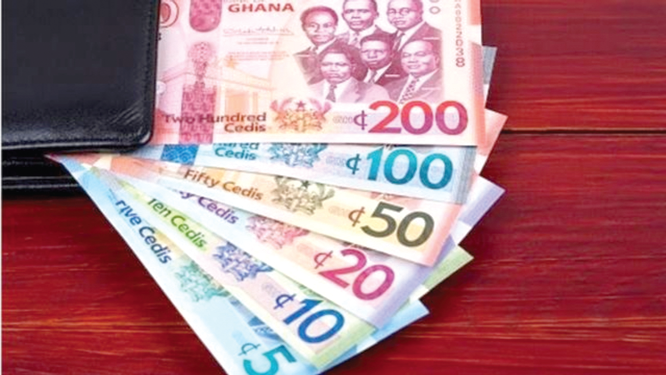
Cedi under pressure — Debt Exchange uncertainty bites hard
There is growing concern among financial experts and analysts that the cedi might wobble again as it begins to slide against the major trading currency, the dollar.
The fear has been heightened because while the Central Bank has pegged the cedi to dollar at a weekly average of GH¢9 over the past week ending January 13, the forex bureaus, however, are trading the dollar by an extra GHC¢3 on top of the BoG rate at GH¢12 to one dollar.
A major concern is the uncertainties surrounding the Government’s Debt Exchange and Restructuring programme (DDEP), which many believe may delay the IMF funds.
Even though government is clear that it hoped to conclude all negotiations on its DDEP and subsequently secure the much needed financing from the Bretton Wood Institution, there are subtle fears that a delay would have dire consequence for the currency.
Government has agreed a three-year financial support of US$3 billion with the IMF as the country’s debts was choking the fiscal space.
As part of the conditions to access the IMF facility, the government has embarked on a debt restructuring exercise to give it the room to manage its debts to sustainable levels. Ghana’s total debt currently stands at GH¢467 billon.
Subsequently government announced a road map on how it intended to deal with its creditors. However, the government has been forced to exclude pensions from the DDEP. That trade-off was to rope in individual bond holders who were initially exempted from the debt exchange programme.
There has been disagreement on that front with some group of individual bond holders threatening legal action. Government for his part has also postponed the date for the final conclusion of the debt exchange program twice already.
With some multinational companies also set to hold their annual general meetings in the coming weeks which may lead to a possible repatriation of dividends, analysts believe that should the government fail to secure an IMF deal in the first quarter of the year, this may spell doom for the cedi which has already started losing grounds against the dollar in the first few weeks of the year.
Government sources say, they expect all discussions on the ongoing process to conclude by the middle of next month.
Speaking to the Graphic Business in an interview, the Head of Research at GCB Capital Limited, Courage Kwesi Boti, said the uncertainties surrounding the debt restructuring programme was not good for the cedi.
The World Bank has also warned that the Ghana cedi may continue to come under pressure in 2023 against the U.S dollar if efforts are not directed at controlling the country’s current account deficit to a sustainable level.
In its January 2022 Global Economic Prospects report, it stated that “large current account deficits are likely to keep currencies under pressure in several countries”, adding to inflation and external vulnerabilities in countries like Ghana.
The report therefore encouraged government to take extra measures to manage its current account deficit in 2023.
Cedi performance
After weeks of sustained recovery, the Ghana Cedi appears to be losing grounds to the dollar, as figures from the Bank of Ghana indicates that the local currency has been depreciating consistently over the last 15-20 days.
The dollar which was selling at GH¢7.9 to a dollar as at December 15, 2022, has appreciated consistently against the cedi and now selling at GH¢9 according to figures released by the central bank on January 10.
On the forex bureau market, the dollar is trading around GH¢12, a situation which analysts fear could lead to an increase in prices again.
The Ghana cedi ended 2022 as the second weakest currency on the African continent with a year-to-date loss of 38.86 per cent to the US dollar, according to Bloomberg. Globally, the local currency placed 145th.
At the beginning of January 2022, the cedi was trading at GH¢5.9 to the US dollar, but by March 2022, the local currency was trading above GH¢8.
In September 2022, the cedi reached double figures, trading at GH¢10 to a dollar and further depreciated to GH¢11 in October.
In November, the cedi lost about 9.5 per cent of its value, peaking at about GH¢14.50 to a dollar, which took losses chalked up by the local currency to 52 per cent, making it the worst performing currency among 148 currencies tracked by Bloomberg.
Towards the end of the year, the local currency made a remarkable turnaround, posting the world’s biggest gain against the United States dollar.
The cedi continued its remarkable journey against the dollar to sell at GH¢7.9 to a dollar, until it started depreciating again.
Uncertainties
Mr Boti said the country currently finds itself in uncertain times, with a lot of volatilities expected especially when most of the factors the market would be looking forward to bring stability are all pending and no clear conclusion on them yet.
“Government is looking forward to finance the 2023 budget from purely concessionary financing from development partners and those will be foreign currency denominated and so it has potential to anchor cedi stability in 2023.”
“There is also talk of gold for oil barter, we do not know the scale yet and the magnitude but at least this will take off some pressure on the cedi,” he stated.
“But all of these measures which could support the cedi are hanging in the balance and the reason is that we have not received board level approval for the IMF programme yet because it hinges on domestic debt restructuring.”
“With all the agitations going on, I await to see what the government would do again, potentially, there would be another extension or they come to the table and make some concessions to the investors and then we move on from there.
“We don’t have conclusion on that yet and depending on how that would go, that is when we will know if we could unlock those bilateral financing, get policy credibility and support from the IMF and by extension the balance of payment support we are looking for,” he explained.
He said the uncertainties surrounding all those policies and actions could be the reason why the cedi was still volatile, stating that this could be the case for the first quarter until there is clarity.
Seasonality effect
Mr Boti also pointed out that what the cedi was currently going through could also be due to seasonal effects.
“We are in January, this is a quarter and seasonality effects are always there, we have to settle the import bills, towards the end of this quarter, when AGMs are held and dividends have been declared, the repatriation will begin,” he stated.
While the Bank of Ghana of Ghana has instructed the multinational banks not to repatriate or pay dividend this year, there is still a number of companies who are unrestricted.
The analyst believes this could put more pressure on the local currency if there is no quick resolution to the IMF deal which is something that could anchor the cedi.
“Any delays in securing the deal will have dire consequences on the economy in 2023 and that is why we must do all we can to secure it,” he cautioned.
 Click the link to read your copy.
Click the link to read your copy.